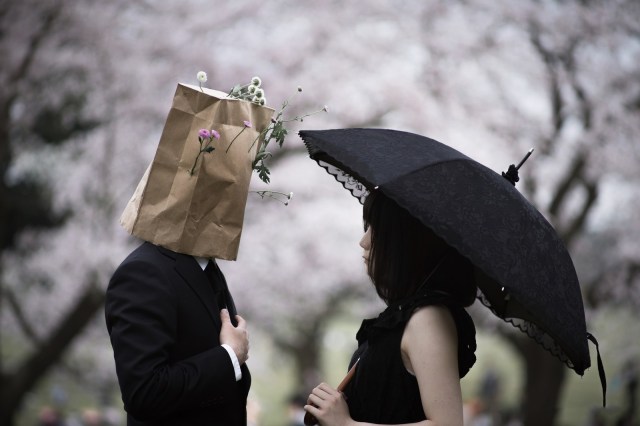
According to BS Fuji’s top dog, there’s a reason why making romance dramas in Japan is an uphill battle.
Sometimes, as The Beatles once sang, all you need is love. Stories about romance can lift us up, make our hearts pound, bring us joy or reduce us to emotional sobs. There is a hearty trove of powerful love stories out there in the world, and even for stories thoroughly bereft of romantic sub-plots, we can always rely on fanworks.
It sounds as though some of the people who think up these epic romances are finding it increasingly hard, however. Chihiro Kameyama, one-time president of the Fuji Television Network and current president of the BS Fuji broadcasting service, shared his thoughts about the current climate—and why it’s so much harder to peddle romance dramas to audiences than it used to be.
▼ Kameyama is responsible for a number of hit TV dramas, such as 1997’s Beach Boys.
Only 3 more episodes of #ビーチボーイズ left to watch. 😟 #ドラマ #dorama #BeachBoys #反町隆史 #竹野内豊 pic.twitter.com/Z8p5R0726R
— ベアちゃん 🌸 (@kojikohai) January 19, 2019
“I think romance dramas are challenging in this current era,” Kameyama said when questioned about the lack of recent Japanese-produced romantic dramas. “Romance has become considered something that happens to other people.”
He continued to explain his theories for what is essential when making a romantic drama, namely the idea of “barriers.” Barriers like class, economic stability, status, and long-distance relationships have all been mined rather thoroughly leading to audiences feeling bored with the genre. These barriers also vary from era to era, which leads to another problem: the world and its issues loom large in the current Japanese audience’s consciousness, especially in the aftermath of the 2011 Tohoku earthquake, Kameyama believes.
▼ Knowing how fragile life is, the hot-and-cold emotions in romantic dramas can feel frivolous.
Kameyama also suggested that the way we consume TV shows in the present day may be a factor, as well. TV dramas used to air over a fixed period with set intervals, so fans were encouraged to deliberate over and anticipate upcoming plot developments. Nowadays, though, there’s more of a push to “binge-watch” series all in one sitting. Fans also take to the Internet to discuss episodes immediately as they drop, which impacts romance shows disproportionately compared to other genres.
▼ If you already know the hows and whys of a couple getting together, you may not tune in to enjoy the ride.
Other hurdles, from Kameyama’s observation, are that the current generation of 20-to-30-year-olds are incredibly serious about romance and are reluctant to get hurt or to hurt others, which causes problems when writing realistic dialogue. Realism itself, regardless of genre, is another issue, in Kameyama’s opinion. Previously, he feels, it was easier to get away with bigger storytelling conceits, such as incorporating dangerous situations or science fiction elements like time travel, into a story, as long as you kept the smaller details feeling like they were grounded in reality. Modern audiences can be much less forgiving when it comes to suspending their disbelief, though, which complicates the creative process.
That said, it’s not as though there have been no recent successes at all when it comes to the romance genre. Anime hit Your Name proved a healthy attitude for fantastic romances in 2016, and romantic sparks in reality show Terrace House drew droves of people to watch. The secret seems to be in finding a fresh twist that doesn’t alienate its audience and instead reminds them of why love is worth watching in the first place.
Source: Yahoo! Japan News/Withnews via Hachima Kikou
Top image: Pakutaso
Insert images: Pakutaso (1,2)
● Want to hear about SoraNews24’s latest articles as soon as they’re published? Follow us on Facebook and Twitter!



 Do women who love manga have a harder time finding real-life romance?
Do women who love manga have a harder time finding real-life romance? What makes a Japanese woman think she and a guy have become lovers? Survey investigates
What makes a Japanese woman think she and a guy have become lovers? Survey investigates How many married people with children in Japan admit to cheating on their spouse? Survey says…
How many married people with children in Japan admit to cheating on their spouse? Survey says… Japanese drama set in New York is your next binge-watch series
Japanese drama set in New York is your next binge-watch series Japan Railways looking for love in all the weird places again with the Love Love Bench
Japan Railways looking for love in all the weird places again with the Love Love Bench Red light district sushi restaurant in Tokyo shows us just how wrong we were about it
Red light district sushi restaurant in Tokyo shows us just how wrong we were about it Tokyo Tsukiji fish market site to be redeveloped with 50,000-seat stadium, hotel, shopping center
Tokyo Tsukiji fish market site to be redeveloped with 50,000-seat stadium, hotel, shopping center Japanese ramen restaurants under pressure from new yen banknotes
Japanese ramen restaurants under pressure from new yen banknotes Anime girl English teacher Ellen-sensei becomes VTuber/VVTUber and NFT
Anime girl English teacher Ellen-sensei becomes VTuber/VVTUber and NFT Beautiful Red and Blue Star luxury trains set to be Japan’s new Hokkaido travel stars
Beautiful Red and Blue Star luxury trains set to be Japan’s new Hokkaido travel stars French Fries Bread in Tokyo’s Shibuya becomes a hit on social media
French Fries Bread in Tokyo’s Shibuya becomes a hit on social media Pokémon Sleep camping suite and guestrooms coming to Tokyo Hyatt along with giant Snorlax burgers
Pokémon Sleep camping suite and guestrooms coming to Tokyo Hyatt along with giant Snorlax burgers Sandwiches fit for a sumo served up in Osaka【Taste Test】
Sandwiches fit for a sumo served up in Osaka【Taste Test】 Starbucks Japan adds a Motto Frappuccino to the menu for a limited time
Starbucks Japan adds a Motto Frappuccino to the menu for a limited time New private rooms on Tokaido Shinkansen change the way we travel from Tokyo to Kyoto
New private rooms on Tokaido Shinkansen change the way we travel from Tokyo to Kyoto McDonald’s new Happy Meals offer up cute and practical Sanrio lifestyle goods
McDonald’s new Happy Meals offer up cute and practical Sanrio lifestyle goods All-you-can-drink Starbucks and amazing views part of Tokyo’s new 170 meter-high sky lounge
All-you-can-drink Starbucks and amazing views part of Tokyo’s new 170 meter-high sky lounge More foreign tourists than ever before in history visited Japan last month
More foreign tourists than ever before in history visited Japan last month Studio Ghibli releases new action figures featuring Nausicaä of the Valley of the Wind characters
Studio Ghibli releases new action figures featuring Nausicaä of the Valley of the Wind characters Starbucks reopens at Shibuya Scramble Crossing with new look and design concept
Starbucks reopens at Shibuya Scramble Crossing with new look and design concept Studio Ghibli glasses cases let anime characters keep an eye on your spectacles
Studio Ghibli glasses cases let anime characters keep an eye on your spectacles Beautiful Ghibli sealing wax kits let you create accessories and elegant letter decorations【Pics】
Beautiful Ghibli sealing wax kits let you create accessories and elegant letter decorations【Pics】 Studio Ghibli releases Kiki’s Delivery Service chocolate cake pouches in Japan
Studio Ghibli releases Kiki’s Delivery Service chocolate cake pouches in Japan New definition of “Japanese whiskey” goes into effect to prevent fakes from fooling overseas buyers
New definition of “Japanese whiskey” goes into effect to prevent fakes from fooling overseas buyers Our Japanese reporter visits Costco in the U.S., finds super American and very Japanese things
Our Japanese reporter visits Costco in the U.S., finds super American and very Japanese things Studio Ghibli unveils Mother’s Day gift set that captures the love in My Neighbour Totoro
Studio Ghibli unveils Mother’s Day gift set that captures the love in My Neighbour Totoro New Japanese KitKat flavour stars Sanrio characters, including Hello Kitty
New Japanese KitKat flavour stars Sanrio characters, including Hello Kitty New Pokémon cakes let you eat your way through Pikachu and all the Eevee evolutions
New Pokémon cakes let you eat your way through Pikachu and all the Eevee evolutions Disney princesses get official manga makeovers for Manga Princess Cafe opening in Tokyo
Disney princesses get official manga makeovers for Manga Princess Cafe opening in Tokyo Sales of Japan’s most convenient train ticket/shopping payment cards suspended indefinitely
Sales of Japan’s most convenient train ticket/shopping payment cards suspended indefinitely Sold-out Studio Ghibli desktop humidifiers are back so Totoro can help you through the dry season
Sold-out Studio Ghibli desktop humidifiers are back so Totoro can help you through the dry season Japanese government to make first change to romanization spelling rules since the 1950s
Japanese government to make first change to romanization spelling rules since the 1950s Ghibli founders Toshio Suzuki and Hayao Miyazaki contribute to Japanese whisky Totoro label design
Ghibli founders Toshio Suzuki and Hayao Miyazaki contribute to Japanese whisky Totoro label design Doraemon found buried at sea as scene from 1993 anime becomes real life【Photos】
Doraemon found buried at sea as scene from 1993 anime becomes real life【Photos】 Tokyo’s most famous Starbucks is closed
Tokyo’s most famous Starbucks is closed One Piece characters’ nationalities revealed, but fans have mixed opinions
One Piece characters’ nationalities revealed, but fans have mixed opinions We asked a Uniqlo employee what four things we should buy and their suggestions didn’t disappoint
We asked a Uniqlo employee what four things we should buy and their suggestions didn’t disappoint Princesses, fruits, and blacksmiths: Study reveals the 30 most unusual family names in Japan
Princesses, fruits, and blacksmiths: Study reveals the 30 most unusual family names in Japan Ease your Christmas loneliness with idol singer Santa cosplay 【Photos】
Ease your Christmas loneliness with idol singer Santa cosplay 【Photos】 Japanese man asks for the password to women’s hearts, learns something he didn’t want to know
Japanese man asks for the password to women’s hearts, learns something he didn’t want to know Majority of surveyed Japanese workers have dated a coworker, over 20 percent their boss or senpai
Majority of surveyed Japanese workers have dated a coworker, over 20 percent their boss or senpai International survey finds that 90% are open to a romantic encounter with a Korean partner
International survey finds that 90% are open to a romantic encounter with a Korean partner 40 percent of Japanese women in survey say they’d be OK with a “Christmas Eve-only” boyfriend
40 percent of Japanese women in survey say they’d be OK with a “Christmas Eve-only” boyfriend Is the ideal spouse someone who’s your best friend or your war buddy? Japanese singles sound off
Is the ideal spouse someone who’s your best friend or your war buddy? Japanese singles sound off Anime-style boys’ love comes to South Park with yaoi-themed episode
Anime-style boys’ love comes to South Park with yaoi-themed episode Educator offers advice for Japanese schoolgirls who get asked out by their teachers
Educator offers advice for Japanese schoolgirls who get asked out by their teachers Japanese men list seven traits that would make it impossible for them to date a woman
Japanese men list seven traits that would make it impossible for them to date a woman One in four young Japanese adults say love is a pain in the butt【Survey】
One in four young Japanese adults say love is a pain in the butt【Survey】 Why you probably won’t get home-made Valentine chocolate and love confession from a Japanese girl
Why you probably won’t get home-made Valentine chocolate and love confession from a Japanese girl Japan’s biggest dating app says young people not interested in romance, creates AI girlfriend app
Japan’s biggest dating app says young people not interested in romance, creates AI girlfriend app Park in Japan offers special love confession plans with 6 million lights
Park in Japan offers special love confession plans with 6 million lights Japan’s year-end Kohaku song battle rumored to end soon
Japan’s year-end Kohaku song battle rumored to end soon
Leave a Reply